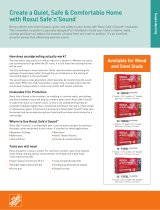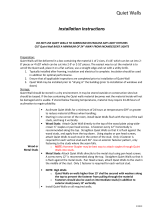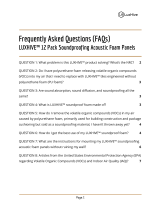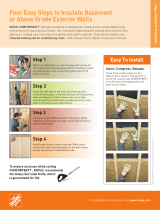
How does soundproofing actually work?
The only way to stop sound is to either reduce it or absorb it. Whether you opt to
use a professional or go down the DIY route, it is still these two techniques that
will be used.
The first technique is noise reduction. Noise reduction works by blocking the
passage of sound waves either through the use of distance or the placing of
intervening objects in the sound path.
The second way is noise absorption, which operates by transforming the sound
wave itself. While this might sound like a magic trick, it simply means that the
sound wave changes when it comes into contact with certain materials.
Invaluable Fire Protection
ROCKWOOL Safe’n’Sound is fire
-resistant, so installing it in interior walls, and
ceilings and floors between rooms will help you create a safer home. ROCKWOOL
Safe’n’Sound
™
is made from stone, so it doesn’t burn. In fact, it can withstand
temperatures hundreds of degrees higher than conventional insulations. Nor will
it create smoke or release toxic gases. In the event of a house fire, ROCKWOOL
Safe’n’Sound
™
helps slow the spread, and can provide you and your family with
precious extra minutes for a safe escape.
Where to Use ROCKWOOL Safe’n’Sound
™
ROCKWOOL Safe’n’Sound
™
is an important part in any renovation project to
maximize the peace, quiet and privacy in your home. It’s perfect for these
applications:
■
Basement Ceilings
■
Bedrooms
■
Bathrooms
■
Home Theatre Rooms
■
Home Offices
■
Furnace & Laundry Rooms
Tools you will need
ROCKWOOL insulation is easy to install. For maximum comfort, wear long-
sleeved, loose-fitting clothing, gloves, eye protection, knee pads and a dust
mask. Tools required include:
■
Tape measure (minimum 25 ft.)
■
Long serrated bread knife
■
Straight edge (a board will do)
■
Caulking gun/Acoustical sealant
■
Screw gun
■
Drywall screws
Create a Quiet, Safe & Comfortable Home
w
ith ROCKWOOL Safe’n’Sound
™
Bring a whole new level of peace, quiet, and safety to your home with ROCKWOOL Safe’n’Sound
™
insulation. This innovative insulation is specially designed for installation inside your home's interior
walls, ceilings and floors to reduce the transfer of noise from one room to another. It’s an excellent
acoustic barrier that effectively absorbs sound.
16" WOOD
ON CENTRE
3" (thick) x 15¼" (width) x 47" (length)
[387 mm x 1194 mm x 76 mm]
24" WOOD
ON CENTRE
3" (thick) x 23" (width) x 47" (length)
[584 mm x 1194 mm x 76 mm]
16" STEEL
ON CENTRE
3" (thick) x 16¼" (width) x 47" (length)
[387 mm x 1194 mm x 76 mm]
24" STEEL
ON CENTRE
3" (thick) x 24¼" (width) x 48" (length)
[610 mm x 1219 mm x 76 mm]
Available for Wood
and Steel Studs
Soundproofing

Easy To Cut
S
tep 1
Install Safe‘n’Sound
™
in the stud cavities to dampen
sound transmission. ROCKWOOL Safe‘n’Sound
™
insulation is semi-rigid and provides a friction fit between
studs.
Step 2
Screw resilient steel channels to the walls, spacing them
16 inches on centre. The channel’s design minimizes
the amount of direct contact between the studs and
the drywall.
Step 3
Install drywall vertically to the wall, screwing it into the
resilient channel. For best results, use 5/8” drywall.
Step 4 (optional)
Apply adhesive to the back of the second layer and install
it horizontally. Drive type G screws through the second
layer into the first layer of drywall avoiding both the studs
and resilient channels.
Step 5
Using a caulking gun and a special acoustical sealant,
fill all cracks around the wall’s perimeter, especially at
the bottom of the wall. Also, caulk any gaps between the
drywall and electrical boxes and heat ducts.
Five Easy Steps to Soundproof
Interior P
artition Walls
ROCKWOOL Safe’n’Sound
TM
semi rigid batts can be easily installed in all interior walls between
rooms and more effectively reduce air flow – thereby decreasing sound transmission. In
addition, ROCKWOOL is performance tested to provide higher sound absorption against low
frequency ranges, i.e. television noise, which are most difficult to block.
Working with ROCKWOOL insulation is a
breeze. It cuts quickly and accurately
with a serrated knife, such as a bread
knife, so you can easily achieve optimal
fit around pipes, electrical boxes,
wiring, ductwork, and between studs
and joists that are less than a standard
width.
Soundproofing
Interior Walls

To ensure accuracy while cutting
ComfortBatt
™
, ROCKWOOL
recommends the Husky Serrated
Knife, which is guaranteed for
life.
For additional information, visit
www.ROCKWOOL.com
Step 1
Caulk where wiring runs through the ceiling joists and
around the top of the wall.
Step 2
Cut Safe‘n’Sound
™
with a serrated knife around wires and
ductwork. When insulating around pot lights, use IC rated
pot lights. If not IC rated, a minimum 3" clearance
is recommended.
Step 3
Run resilient channels perpendicular to the ceiling joists
at 16" on-centre. Screw drywall into the resilient channel.
Four Easy Steps to Soundproof
Ceilings Between Floors
Ceiling insulation provides essential sound control between floors in your home. Properly
insulating the ceilings will make your home a more peaceful and quiet place because it will
ensure that footsteps and other sounds do not travel to other rooms.
Insert. Compress. Release.
Those three simple steps are all it
takes to get a snug fit. That great fit is
one of the reasons why Safe’n’Sound
™
is so effective at bringing peace and
quiet to your home.
Soundproofing Ceiling
Bewteen Floors
Easy To Install
-
 1
1
-
 2
2
-
 3
3
ROCKWOOL RXSS31625 Installation guide
- Type
- Installation guide
- This manual is also suitable for
Ask a question and I''ll find the answer in the document
Finding information in a document is now easier with AI
Related papers
Other documents
-
 Technoflex M2000-100HD User guide
Technoflex M2000-100HD User guide
-
 Roxul RXSS31525 Installation guide
Roxul RXSS31525 Installation guide
-
 Quiet Wall QW420 Installation guide
Quiet Wall QW420 Installation guide
-
 LUXHIVE KL-BD7E-FS6R User guide
LUXHIVE KL-BD7E-FS6R User guide
-
Johns Manville TC5515 Installation guide
-
 Roxul RXCB551525 Installation guide
Roxul RXCB551525 Installation guide
-
none RXCB301525 Installation guide
-
James Hardie 220006 User manual
-
Heatilator Indoor Fireplace IDV4833IT User manual
-
Hearth and Home Technologies Gas Fireplace IDV4833ILT User manual









